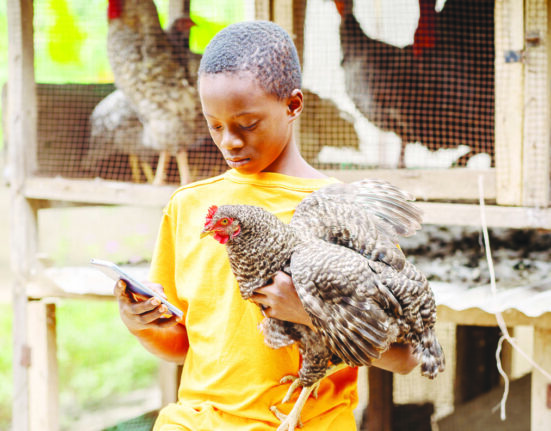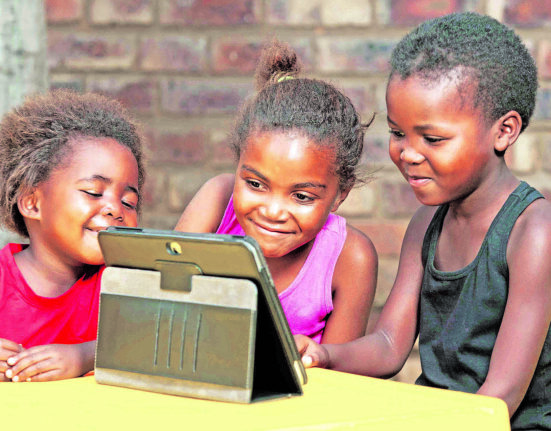(Published Wednesday, December 8, 2021)

By George Bita
It is midday and the shade of a jackfruit tree is the reliable shelter preventing the scorching sunrays from inconveniencing learners in the middle of a home lesson.
The voices of pupils discussing mathematics problems fills the air and blends with sounds of chirping birds perched on nearby tree branches.
Not even the precariously dangling green jackfruits above their heads can stop the learner-centred group discussions of their lesson.
The teacher occasionally moves from one group of pupils to another to ascertain whether they are on the right track.
When the time for discussions is over, a group leader is chosen at random to demonstrate to the entire class what they have come up with.
Elisha Muwanguzi, a Primary Four learner, says the home lessons have helped him continue learning despite the closure of schools to curb the spread of COVID-19.
“Teachers come to our neighbourhood to conduct lessons. The portable blackboard carried along, as well as charts, make the environment similar to the school set-up,” Muwanguzi explains.
Angel Atusabira, a Primary Six pupil, expresses satisfaction with the home study project, saying it has kept her busy during the lockdown.
“The school has shifted home and this is exciting. Our teachers come and follow the timetable to teach us new things everyday,” Atusabira says.
According to Joseph Isiko, a parent, as many children elsewhere relax due to the COVID-19 pandemic, the learners in Namutumba district have instead taken their classrooms to home compounds.
“The children wake up to get ready for lessons that start at 8:00am prompt, like is the arrangement at school,” Isiko says.
Genesis
At the start of the COVID-19 lockdown last year, the education ministry had hinted on registering teachers according to localities to help in community-based teaching and assessment of learners.
However, although the idea was never implemented, it was picked up by teachers in Namutumba, who now visit learners’ homes to deliver the much-needed education.
George Wateta, the head of African School Nabikabala, reveals that the intervention started during the first COVID-19 lockdown in March 2020.
“It was one way of keeping our teachers’ brains fresh and ready to resume normal lessons as soon as schools reopen. In fact, they have been teaching since,” Wateta, who is also the team leader of the home study intervention, says.
Peter Bujunu, the Nabikabala LCI chairperson, commended the project, saying it has saved youths from idling at village trading centres to play cards all day.
“Even the makeshift video halls have fewer clients as children spend the day attending home lessons,” Bujunu says.

Lockdown lessons
Jalilu Kasule, the LCI chairperson of Busambaiza village, says ever since schools closed in 2020 due to COVID-19, children in his locality have been studying from the confines of their homes.
“This arrangement has helped us to curb teenage pregnancies as the girls have no time to indulge in sex that leads to pregnancy.
“These days children wake up to study, just like they do on normal school days,” Kasule says.
Monica Mutesi, a parent, says she is appreciative of the efforts to keep her children occupied, instead of idling at home as schools remain closed due to COVID-19.
“The children also get free meals, courtesy of a local non-governmental organisation, which enables them to concentrate in class,” Mutesi explains.
She says the handling of children at the village level is in line with the health ministry’s move to limit COVID-19 spread at community level.
“The teachers concentrate on educating children from a given village at these learning centres. So it more or less isolates them from neighbouring societies, hence curbing community spread of disease,” she explains.
Judith Nakisinde, a Primary Four teacher, says over 650 children have benefited from the intervention.
“We started after realising that bureaucracy was delaying the interventions. Initially, the ministry had talked about radios, then televisions, but nothing was forthcoming, yet the learners were losing a lot,” Nakisinde notes.
According to Nakisinde, the children are currently being taught from 20 designated compounds, with strict observance of COVID-19 standard operating procedures (SOPs).
A total of 30 teachers have been mobilised for the community service, facilitated by a joint partnership between Namutumba local government and Support for Orphans Uganda Project (SOUP).
Through the project, an estimated 10 tonnes of maize flour and beans have been distributed free of charge to participating families to enable the children to eat well.
He adds that learners range from pre-primary (nursery) to Senior Six, with recruitment dependent on only the child’s willingness to join.
Teaching Targets
Taddeo Wandera, a Primary Five teacher, says the aim is to ensure continuity of learning that had been disrupted by the COVID-19 schools’ lockdown.
“The content per class has been thoroughly covered. As the year comes to an end, I can assure you that the respective syllabuses for all classes are now completed,” Wandera says.
He says the home environment assisted teachers to use the active-learning format that calls for pupil-centred discussions.
“Our children will be in a better position to study under the new O’ level curriculum, which requires learner-centred study. A teacher with chalk dominating class is becoming outdated,” Watera explains.
“Assessment tests are often set by an independent body of examiners. Our teachers only see the papers during the examination and this is done to guard against leakages,” he adds.
In Namutumba district, about 123,143 people reside in the rural neighbourhood out of a total population of 422,771.
According to data from the Uganda Bureau of Statistics (2018), about 7,421 persons, aged between six and 15 years, are not attending school, while 50,478 are in primary schools.
The secondary school population is 12,028. Mobile phone ownership is at 40,275, while internet usage stands at 4,173, adding credence to the relevance of the teachers’ home-classroom intervention.
John Naloka, the district chairperson, says the local government has a budgetary estimate of sh14b for the education department.
He reveals that during the last financial year, about sh505m remained unspent in the education department due to failure by some teachers to access the payroll by the end of the fourth quarter
What Are The Benefits?
Damali Batana, the Namutumba district senior education officer observes that this intervention of teaching learners from homes has helped keep children keep busy during the lockdown.
“An idle mind is the devil’s workshop. Had it not been for this timely intercession, many cases of teenage mothers would be registered in the local government,” Batana says.
She argues that this courageous move by teachers to keep teaching during difficult COVID-19 times is a sign of heroic resilience.
“As Namutumba district education department we are glad to be associated with these teachers, she says.
She discloses that the education department has been offering a supervisory role to ensure rigid compliance to education standards as well as adherence to COVID-19 standard operating Procedures.
Henry Naabye, the Namutumba district planner, says this home-schooling model could be adopted for other areas with low internet connectivity that renders online classes useless.
What Others Say
Proscovia Baluka, P.6, Zirangobi village

Our teachers followed us home to teach us. We are indeed lucky as not every child countrywide got such an opportunity.
Arnold Ntuyo, P6, Busembaiza village

I am excited about going to P.7 next year. All along we have been studying P.6 work and I am sure I am going to pass
Mariam Naigaga, parent

I have four children who are being taught from the home compound free of charge. This is a blessing in these hard times when money is scarce.
Musa Kabanda, parent

Teachers of Namutumba need to be commended. Many teachers chose to relax yet the Government is still paying them








Leave feedback about this